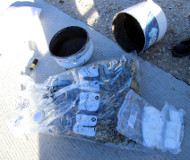1/5/2018
Utah: Cop Cannot Provoke A Violation To Justify A Traffic StopFederal judge rejects traffic stop conducted by Utah cop who prompted a motorist to move out of his way on the interstate.

It is not uncommon for a patrol officer to tailgate a suspect in the hopes of provoking a traffic violation justifying a traffic stop. A federal judge last month decided to end the practice by declaring that Utah Highway Patrol Trooper Jason Tripodi violated the constitution when he goaded Jerry Siaki Esteban Jr into committing a minor turn signal infraction on October 15, 2016.
Esteban was in his silver Ford pickup truck on Interstate 80 that morning when his California license plate drew the trooper's attention. The state police were gaining big headlines from making drug busts on the highway, including the seizure of 236 pounds of methamphetamine a few days prior. So Trooper Tripodi was hunting for out-of-state drivers, and his logs for this period showed that 95 percent of his stops involved drivers from outside Utah.
When Trooper Tripodi noticed that the Esteban was leaning back slightly in his seat, with hands in the "ten and two position," he decided this behavior was suspicious enough to begin following. After a while, the trooper realized that Esteban had not committed any traffic violations. On the road shoulder ahead, however, another police car with lights flashing was writing a ticket to a motorist. Esteban reacted by signaling for a full two seconds before changing lanes to the left, in accordance with the state's move over law.
The trooper then hit the gas, accelerating to 77 MPH behind Esteban. Instead of speeding up beyond the road's 70 MPH speed limit, Esteban quickly signaled and moved out of the way to the right-hand lane. The trooper insisted that the signal lasted just under two seconds, constituting a traffic infraction. Judge Clark Waddoups was inclined to agree that the signal came up a bit short.
"Upon the court's own review of the dash camera video, at reduced speed, the pickup appears to signal and begins to move into the right lane before a full two seconds passes, although two seconds elapse before the lane change is complete and no cars are present in the right lane," Judge Waddoups observed.
It turns out that the judge did not need to decide whether this was a legitimate violation of the law because he found that the trooper was to blame for what happened.
"In the particular circumstances of this case, the court finds that Trooper Tripodi provoked the two-second traffic violation, though perhaps unintentionally," Judge Waddoups ruled. "The Supreme Court has held that observed traffic violations provide the 'quantum of individualized suspicion necessary to ensure that police discretion is sufficiently constrained' in conducting traffic stops. But police discretion is not constrained when an officer's conduct provokes or substantially contributes to a violation, even unintentionally."
Under Utah law, a driver can be cited for impeding traffic if he dawdles in the left lane and refuses to allow faster vehicles to pass.
"In these circumstances, the court finds a reasonable person would have noticed the police car's quick approach and reasonably assumed that they should change lanes as quickly as possible," Judge Waddoups wrote. "Mr. Esteban clearly understood the two-second rule because he implemented it just seconds before while properly passing the earlier emergency vehicle."
The court also found that, once stopped, the trooper dragged out the amount of time needed to write a written warning so that he could call in a drug dog to sniff the car, in violation of the procedures set out in the US Supreme Court's Rodriguez decision (view ruling). He also found the drug dog's "alert" to be highly dubious. As a result, the court ordered the suppression of the two pounds of methamphetamine that were uncovered during the search of the pickup.
A copy of the ruling is available in a 200k PDF file at the source link below.


